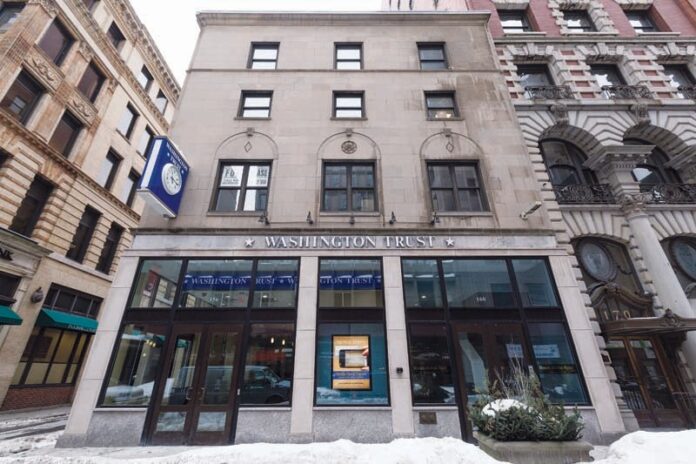
PROVIDENCE – Local bankers are expecting an onslaught of demand from struggling small businesses looking to get a piece of the nearly $350 billion the federal government has promised to distribute nationwide in the form of forgivable loans, starting Friday.
“Stressful” is how Mark Gim, president and chief operating officer of The Washington Trust Co., described the situation at the Westerly-based bank as employees feverishly prepared Thursday for the flood of applications and phone calls expected to pour in less than 24 hours later from business customer who have been crushed by the coronavirus crisis.
In his years in the banking industry – through natural disasters and recessions and the 9/11 terrorist attacks that brought the country to a panicked halt – Gim had never been tasked with a challenge quite like the one presented now, he said.
The U.S. Small Business Administration’s Paycheck Protection Program is slated to launch on Friday morning, just a few days after Congress passed the $2 trillion stimulus package, also known at the CARES Act.
Under the Paycheck Protection Program, SBA-approved lenders and federally insure institutions can begin processing applications from eligible small businesses seeking loans with interest rate as low as 0.5% to cover payroll and operating expenses. They were said to be backed by the federal government and at least partially forgivable, if workers are retained and wages not cut.
Lending institutions such as Washington Trust created task forces outlining the expected process for the new loan program, shifted additional employees to support its commercial lending side, fielded phone calls and online inquiries from interested businesses and continually peppered the SBA with questions about the details of acting as a lender for the program.
One of the problems: The fast-moving situation meant that some of the details of the program had yet to be worked out by Thursday morning, including the requisite documents and the “as-of” date and the verification process through payroll taxes.
“There’s been a lot of partial information,” Gim said Thursday. “The ink is barely dry [on the program.]”
Justin DeShaw, senior vice president and chief lending officer for Centreville Bank, echoed Gim’s concerns.
“My main thing is to make sure we’re doing it right,” DeShaw said. “If you do it wrong, or overpromise and underdeliver, it could have the reverse effect [of what was intended] and we could hurt ourselves.”
However, DeShaw also acknowledged that the SBA and U.S. Treasury Department were also working on a frantic schedule to get money into the hands of those who need it, making the lack of certain details understandable.
“We’re just going to have to adjust, and will,” DeShaw said.
Provisions laid out earlier in the week suggested that although the SBA is the guarantor on the loans, lenders might be financially vulnerable should things go south. Clarity and revision of those guidelines eased that fear somewhat, DeShaw said.
He thought it unlikely the SBA could renege on its promise or revise the terms of the program.
“This really only works if banks have the confidence that if they do the initial check … they will be backed up by the SBA,” DeShaw said.
George Charette, CEO and president of Pawtucket Credit Union, barely registered worry about financial exposure compared with how the credit union would handle the sheer volume of applications. Already, it had received upwards of 100 phone calls from businesses asking for details on the loan program.
Like Washington Trust, Pawtucket Credit Union transferred some workers from less busy departments to help out on its commercial lending side, simultaneously reaching out to all current members to share information about the soon-to-be-available loan program.
Exactly how many applications will come in starting on Friday is another unknown, and with it, the question of whether the allocated federal funding will be enough to cover all the eligible businesses who want it.
Charette felt optimistic the credit union had the capacity to help all of its members as well as new clients, though it might not be as fast as some business owners would like it to be.
Striking the balance between speed and accuracy is important, but taking time to do it right in no way means that financial institutions aren’t committed to helping their community, Gim said.
“The story could easily be written that banks are dragging their feet to do it because they’re worried it might not be profitable or they might take losses, but that’s not the case,” Gim said. “In this situation, [profit] is not the first thing in our minds, but we want to make sure everything is done the right way.”
With 0.5% interest rate and loan forgiveness as long as the funds are used for payroll or other designated expenses, this is hardly an opportunity for financial gain for lending institutions. But that’s not the point, local financial leaders agreed.
“We’re a community bank in a state being particularly hard hit by this and making money off this is not our first order of business right now,” DeShaw said. “We’ll worry about that later.”
Could first-time applicants with certain banks or credit unions lead to new long-term customers?
“If we do a good job and customers are satisfied, then sure, it’s an opportunity to grow long-term,” Gim said. “But that is not the priority. Our priority is to help our community.”












